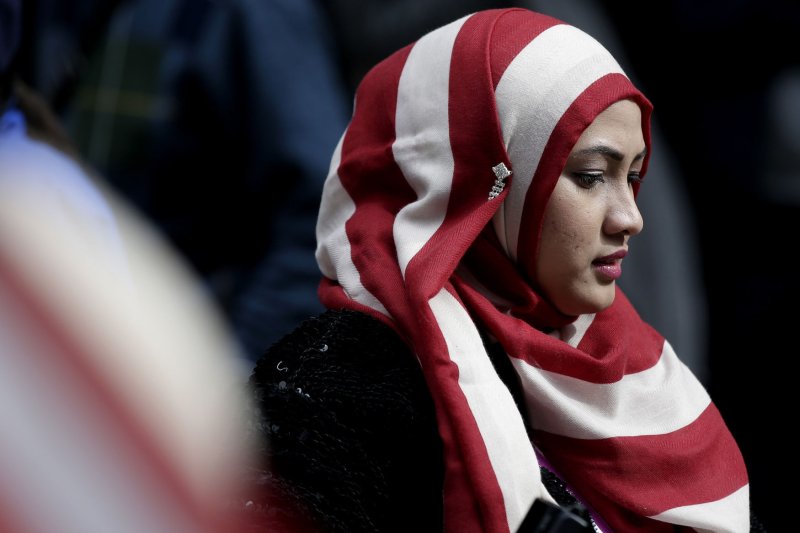European Court says municipalities can limit
wearing of religious symbols
Nov. 28 (UPI) -- The European Union's Court of Justice ruled on Tuesday that public administrations may ban overt religious symbols, like headscarves, in order to create a neutral environment as long it does not single out a particular religion.
The bloc's top court said such a rule must not discriminate in favor or against any specific religion and must be limited "to what is strictly necessary."
The decision stems from a Belgian woman who charged that not wearing an Islamic headscarf violated her religious freedom, leading to the administration in the municipality of Ans to ban all overt religious signs from being worn.
"In order to put in place an entirely neutral administrative environment, a public administration may prohibit the visible wearing in the workplace of any sign revealing philosophical or religious beliefs. Such a rule is not discriminatory if applied in a general and indiscriminate manner to all of that administration's staff," the court said.
The court said while each member state and infra-state body has a "margin of discretion" in designing its neutral policies, it said that rules must be made in a "consistent and systematic manner, and the measures adopted to achieve it must be limited."
The same court ruled in 2021 that private employers in the European Union could prohibit headscarves if it's part of a comprehensive ban on all religious and political symbols in relation to a policy on neutrality.
That decision arose from a case brought by two Muslim women working in Germany, reaffirming a similar decision made in 2017.
==================================================
Europe in Open Revolt
Geert Wilders’ landslide victory in the Netherlands
has shocked the chattering class. It shouldn’t have.
Plus: How to save France.
“Europe is in shock,” write Ayaan Hirsi Ali and Evelyn Markus in our lead story today.
The cause of that shock is the triumph of Geert Wilders in last week’s Dutch elections. That the anti-immigration populist now leads the largest party in the Dutch parliament is indeed a stunning outcome given his status as an outcast from the mainstream of Dutch politics.
But zoom out and his victory is entirely in keeping with a continent-wide trend. In Italy, Giorgia Meloni has been in office for a year. In Germany, the right-wing AfD party is rising in the polls. In France, Marine Le Pen is more popular than Emmanuel Macron.
In 2016, the twin electoral wins for Donald Trump and Brexit were said to herald the arrival of a populist moment. That was seven years ago. This populist moment now seems to be lasting an awfully long time.
And yet serious, good-faith examinations of why outsider parties are faring so well are hard to come by. Instead, we must wade through unhelpful, knee-jerk descriptions of everyone from an Argentine libertarian to an Italian Catholic national-conservative to a Dutch agnostic nativist as “Trump-like.” The comparison usually prefaces a shallow, parochial analysis.
In a post on the recent string of victories for radical right-wingers, the economist and blogger Tyler Cowen noted that “if you can’t talk about/think about/write about these developments without perpetually moralizing, it is hard to be an intelligent commentator today,” adding that “if your main theory here is ‘racism,’ your contribution to the discourse probably is negative.”
Cowen also suggests that since these parties keep winning elections, “you can’t call them ‘far right’ anymore! How about ‘deep center?’ ” I take the point, but I’m not sure that’s quite right either. But whatever we call Wilders et al., their impact on European politics is only growing.
Today, we offer two stories pegged to events on the other side of the Atlantic that offer more light than heat, helping us to understand a continent in revolt.
First, Ayaan and Evelyn explain the success of Geert Wilders through firsthand experience. They write that they are not shocked by his victory “because we are both Dutch—and because we both left the Netherlands because of the phenomena that have now brought Wilders to power.”
Our second piece is by the French thinker Christophe Guilluy, who says his country is in “economic, social, and cultural chaos” but that “there is one hope left. It is not a hope placed in politicians, or in intellectuals and certainly not in ideologues; rather it is one founded on the majority’s instinct for survival.”
Read his full essay, on how ordinary French people can save the French Republic:
============================================================




No comments:
Post a Comment